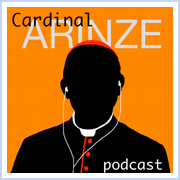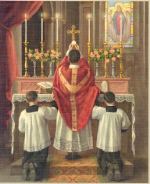CONGREGATION FOR DIVINE WORSHIP AND THE DISCIPLINE OF THE SACRAMENT
INTRODUCING “REDEMPTIONIS SACRAMENTUM”
(On certain matters to be observed or to be avoided regarding the Most Holy Eucharist)
1. Origins of this Instruction
It helps first of all to place this Instruction at its origins. At the Solemn Last Supper Mass on Holy Thursday in St Peter's Basilica, on April 17 2003, the Holy Father signed and gave to the Church his fourteenth encyclical letter, Ecclesia de Eucharistia.
In this beautiful document Pope John Paul II states, inter alia, that the Holy Eucharist “stands at the centre of the Church's life” (n. 3), that “it unites heaven and earth. It embraces and permeates all creation” (n. 8), and that it “is the most precious possession which the Church can have in her journey through history” (n. 9).
At the same time he notes that there are positive and negative developments in its celebration and worship since the Second Vatican Council (n. 10), that a number of abuses have been a source of suffering for many and that he considers it his duty “to appeal urgently that the liturgical norms for the celebration of the Eucharist be observed with great fidelity” (n. 52). “Precisely to bring out more clearly this deeper meaning of liturgical norms”, he continued, “I have asked the competent offices of the Roman Curia to prepare a more specific document, including prescriptions of a juridical nature, on this very important subject. No one is permitted to undervalue the mystery entrusted to our hands: it is too great for anyone to feel free to treat it lightly and with disregard for its sacredness and its universality” (n. 52).
This is the origin of this Instruction which the Congregation for Divine Worship and the Discipline of the Sacraments in close collaboration with the Congregation for the Doctrine of the Faith, now offers to the Latin Church.
2. Reasons for Liturgical Norms
Someone may ask why there should be liturgical norms at all. Would creativity, spontaneity, the freedom of the children of God and ordinary good sense not be enough? Why should the worship of God be regimented by rubrics and regulations? Is it not enough just to teach people the beauty and the exalted nature of the liturgy?
Liturgical norms are necessary because “in liturgy full public worship is performed by the Mystical Body of Jesus Christ, that is, by the Head and by his members. From this it follows that every liturgical celebration, because it is an action of Christ the priest and of his Body the Church, is a sacred action surpassing all others” (Sacrosanctum Concilium, 7). And the summit of the liturgy is the Eucharistic celebration. No one should be surprised if, with the passage of time, Holy Mother Church has developed words and actions, and therefore directives, for this supreme act of worship. Eucharistic norms are devised to express and protect the Eucharistic mystery and also manifest that it is the Church that celebrates this august sacrifice and sacrament. As Pope John Paul II puts it. “These norms are a concrete expression of the authentically ecclesial nature of the Eucharist; this is their deepest meaning. Liturgy is never anyone's private property, be it of the celebrant or of the community in which the mysteries are celebrated” (Ecclesia de Eucharistia, 52).
It follows that “priests who faithfully celebrate Mass according to the liturgical norms, and communities which conform to these norms, quietly but eloquently demonstrate their love for the Church” (ibid.).
Obviously, external conformity is not enough. Faith, hope and charity which also manifest themselves in acts of solidarity with the needy, are demanded by participation in the Holy Eucharist. This Instruction underlines this dimension in article 5: “A merely external observation of norms would obviously be contrary to the nature of the sacred Liturgy, in which Christ himself wishes to gather his Church, so that together with himself she will be ‘one body and one spirit’. For this reason, external action must be illuminated by faith and charity which unite us with Christ and with one another and engender love for the poor and the abandoned”.
3. Is it important to pay attention to Abuses?
An allied temptation which has to be resisted is that it is a waste of time to pay attention to liturgical abuses. Someone wrote that abuses always existed and always will exist, and that therefore we should just get on with positive liturgical formation and celebration.
This objection, true in part, can be rather misleading. All abuses regarding the Holy Eucharist are not of the same weight. Some threaten to make the sacrament invalid. Some are manifestations of deficiency in Eucharistic faith. Others contribute to confusion among the people of God and to growing desacralization of Eucharistic celebrations. They are not banal.
Of course liturgical formation is necessary for all in the Church. “It is vitally necessary”, says the Second Vatican Council, “that attention be directed, above all, to the liturgical instruction of the clergy” (Sacrosanctum Concilium, 14). But it is also true that “in various parts of the Church abuses have occurred, leading to confusion with regard to sound faith and Catholic doctrine concerning this wonderful sacrament” (Ecclesia de Eucharistia, 10). “Not infrequently, abuses are rooted in a false understanding of liberty” (Instruction, 7). “Arbitrary actions are not conducive to true renewal” (Instruction, 11) for which the Second Vatican Council hoped. “These abuses have nothing to do with the authentic spirit of the Council and must be prudently and firmly corrected by Pastors” (John Paul II: Letter on 40th Anniv. of Sacrosanctum Concilium, Spiritus et Sponsa, 15).
As for those who modify liturgical texts on their own authority it is important to observe with this Instruction that “the sacred Liturgy is quite intimately connected with principles of doctrine, so that the use of unapproved texts and rites necessarily leads either to the diminution or to the elimination of that necessary link between the lex orandi and the lex credendi (Instruction, 10).
4. Overview of the Instruction
The Instruction has an introduction, eight chapters and a conclusion.
The first chapter on the regulation of the sacred Liturgy speaks of the roles of the Apostolic See, the Diocesan Bishop, the Bishops' Conference, Priests and Deacons. I single out the role of the Diocesan Bishop. He is the high priest of his flock. He directs, encourages, promotes and organizes. He looks into sacred music and art. He sets up needed commissions for liturgy, music and sacred art (Instruction, 22, 25). He seeks remedies for abuses and it is to him or his assistants that recourse should first be made rather than to the Apostolic See (Instruction, 176-182, 184).
Priests have also made solemn promises to exercise with fidelity their ministry, as have deacons. They are expected to live up to their sacred responsibilities.
The second chapter concentrates on the participation of the lay faithful in the Eucharistic celebration. Baptism is the foundation for the common priesthood (Instruction, 36, 37). The ordained priest remains indispensable for a Christian community and the roles of the priests and of the lay faithful should not be confused (Instruction, 42, 45). Laypeople have their proper role. The Instruction stresses that this does not mean that everybody has to be doing something. Rather it is a question of being fully alive to the great privilege that God has given them in calling them to participate with mind and heart and their entire life in the liturgy and through it to receive God's grace. It is important to understand this properly and not to suppose that the Instruction is somehow biased against laypeople.
Chapters 3, 4 and 5 seek to answer some of the questions sometimes asked and to address some known abuses regarding the actual Mass celebration, discernment on who receives Holy Communion and who should not, care required for Holy Communion under two forms and questions regarding sacred vestments and vessels, posture while receiving Holy Communion and such like.
Chapter 6 is on worship of the Holy Eucharist outside Mass. It treats of due respect for the tabernacle, and practices such as visits to the Blessed Sacrament, Perpetual Adoration Chapel, and Eucharistic Processions and Congresses (Instruction, 130, 135-136, 140, 142-145).
Chapter 7 gives attention to extraordinary offices entrusted to the lay faithful, such as those of extraordinary ministers of Holy Communion, instructors or leaders of prayer services in the absence of a priest (Instruction, 147-169). These roles are different from what the Instruction speaks of in Chapter 2, where it talks of the ordinary participation of laypeople in the liturgy, and in particular in the Eucharist. Here it is a question of the things that laypeople are called upon to do when sufficient priests or even deacons are not available. The Holy See has paid considerable attention to this question in recent years and this Instruction follows suite, adding further considerations for certain circumstances.
The final chapter is on canonical remedies for crimes or abuses against the Holy Eucharist. The main remedy in the long term is proper formation and instruction and sound faith. But when abuses do occur, the Church has a duty to address them in a clear and charitable way.
5. Conclusion
In view of the article of faith that the Mass is a sacramental re-presentation of the Sacrifice of the Cross (cf Council of Trent: DS 1740) and that in the most blessed sacrament of the Eucharist “ the body and blood, together with the soul and divinity, of our Lord Jesus Christ and, therefore, the whole Christ is truly, really and substantially contained” (Council of Trent: DS 1651; cf CCC 1374), it is clear that liturgical norms regarding the Holy Eucharist deserve our attention. They are not meticulous rubrics dictated by legalistically bent minds.
“The most blessed Eucharist contains the Church's entire spiritual wealth, that is, Christ himself, our passover and living bread” (Presbyt. Ordinis, 5). Priests and Bishops are ordained above all to celebrate the Eucharistic sacrifice and give the Body and Blood of Christ to the faithful. Deacons and, in their own ways, acolytes, other servers, lectors and choirs and specially deputed lay faithful are recalled to assist in definite functions. They should all in faith and devotion strive to discharge their various ministries.
The Instruction therefore concludes that the Congregation for Divine Worship and the Discipline of the Sacraments hopes that “by the diligent application of those things that are called in this Instruction, human weakness may come to pose less of an obstacle to the action of the Most Holy Sacrament of the Eucharist, and that with all distortion set aside and every reprobated practice removed, through the intercession of the Blessed Virgin Mary, ‘Woman of the Eucharist’, the saving presence of Christ in the Sacrament of his Body and Blood may shine brightly upon all people” (Instruction, 185).
Francis Card. Arinze
23rd April 2004
Link









